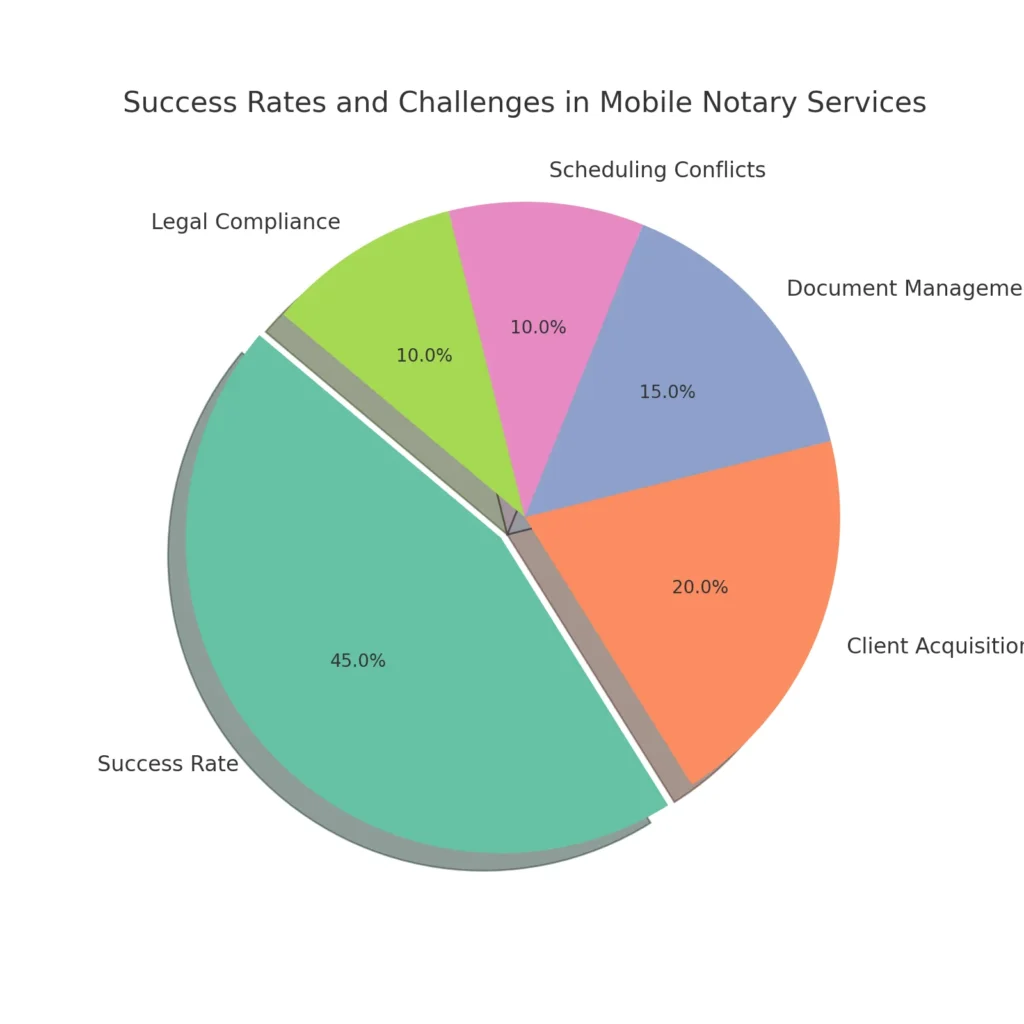In today’s fast-paced world, the demand for mobile notary services has skyrocketed, providing a unique opportunity for entrepreneurs to create a thriving business. Mobile notary professionals offer convenient, on-the-go document notarization, meeting clients at locations that suit their schedules. This service is becoming essential, as it caters to busy individuals, businesses, and industries that require notarizations quickly and efficiently. From real estate closings to loan document verification, the mobile notary industry has shown promising growth, driven by flexibility and customer demand.
| Statistic | Value |
|---|---|
| Global Market Size (2023) | $1.5 billion |
| Projected Annual Growth Rate | 5.8% |
| U.S. Market Share | 65% of global market |
| Demand Increase in Last 5 Years | 40% growth |
| Key Service Areas | Real estate, legal, financial sectors |
| Most Requested Service | Real estate closings and loan document notarization |
Why Choose Mobile Notary Services?
Starting a mobile notary business is an attractive option for entrepreneurs due to its high demand and flexible structure. As more clients seek convenience, mobile notaries fill the gap by bringing essential notarization services directly to people’s homes, offices, and meeting spots. This flexibility appeals to busy professionals, elderly clients, and individuals with limited mobility, creating a substantial client base across various sectors. The need for secure, verified documents in fields like real estate, legal, and finance ensures a steady stream of work.
Furthermore, the startup costs for a mobile notary business are relatively low compared to traditional brick-and-mortar businesses. With a minimal initial investment, notaries can start earning quickly while enjoying the freedom of setting their own hours. This appeal has driven a 40% growth in mobile notary services in recent years, with more entrepreneurs drawn to the stability and income potential of the industry.
Read more: – Top 10 Ideas for Financial Planning and Tax Preparation Business Startups
Current Trends and Future Opportunities in Mobile Notary Services
| Trend/Technology | Description | Impact on Industry |
|---|---|---|
| E-Notarization | Electronic notarization for remote clients | Streamlines process, expands client base |
| Digital Signatures | Secure, verifiable digital document signing | Increases speed and trust in transactions |
| Mobile Apps | Apps for managing appointments and payments | Improves client convenience and scheduling |
| Remote Online Notarization (RON) | Virtual notarizations via video calls | Expands reach, allows out-of-state clients |
| Increased Real Estate Demand | Frequent notarization needs in real estate | Steady client flow, repeat business potential |
The mobile notary industry is evolving rapidly, shaped by both technological advancements and shifts in customer expectations. One major trend is the growing use of digital tools that simplify and speed up the notarization process. For instance, e-notarization—where documents are signed and authenticated electronically—is on the rise, catering to clients who prefer a seamless, paperless experience. This shift is creating an ideal entry point for tech-savvy entrepreneurs who can leverage digital tools to meet the demand for fast, efficient service.
Another key trend is the increasing reliance on mobile notary services in sectors like real estate and finance, where the demand for notarized documents is consistent and often time-sensitive. This is especially true for remote clients, who value the flexibility and accessibility that mobile notaries offer. As more industries recognize the advantages of mobile notary services, future opportunities for business growth continue to expand. Experts project that sectors like healthcare and insurance will soon join the demand for mobile notarization as they adopt mobile verification practices for compliance and security.
Read more: – Top 10 Ideas for Tax Preparation and Filing Business Startups
Top 10 Ideas for Mobile Notary Services Business Startups
If you’re ready to dive into the mobile notary industry, there are plenty of niches you can explore to stand out. Here are ten promising business ideas that cater to different client needs, budgets, and growth potentials.
| Business Idea | Target Market | Startup Cost Range |
|---|---|---|
| Real Estate Document Notarization | Real estate agents, homebuyers | $500 – $1,000 |
| Financial Document Notarization | Banks, financial institutions | $600 – $1,200 |
| Legal Document Notarization | Lawyers, law firms | $700 – $1,300 |
| Healthcare Document Notarization | Hospitals, clinics | $500 – $1,000 |
| Immigration Document Notarization | Immigrants, immigration lawyers | $500 – $1,200 |
| Corporate Notarization Services | Corporations, small businesses | $800 – $1,500 |
| Mobile Notary for Title Transfers | Car dealerships, private sellers | $400 – $1,000 |
| Wedding Officiant Notary | Couples | $500 – $1,200 |
| Remote Online Notary (RON) | Remote, out-of-state clients | $1,000 – $2,500 |
| Notary Training and Consulting | New notaries | $1,200 – $2,500 |
1. Real Estate Document Notarization
- Why: Real estate transactions require frequent notarizations for mortgages, deeds, and agreements.
- Startup Requirements: Notary certification, real estate document knowledge.
- Target Market: Real estate agents, homebuyers, and brokers.
- Estimated Costs: $500-$1,000.
2. Financial Document Notarization
- Why: Loan agreements, investment papers, and financial affidavits need secure notarization.
- Startup Requirements: Financial document handling skills, reliable transportation.
- Target Market: Banks, financial institutions, and private lenders.
- Estimated Costs: $600-$1,200.
3. Legal Document Notarization
- Why: Wills, affidavits, and other legal documents often require a notary.
- Startup Requirements: Basic legal knowledge, notary stamp, mobile setup.
- Target Market: Lawyers, law firms, and individuals needing legal documentation.
- Estimated Costs: $700-$1,300.
4. Healthcare Document Notarization
- Why: Medical records, consent forms, and healthcare proxies often require notarization.
- Startup Requirements: Familiarity with healthcare forms, flexible availability.
- Target Market: Hospitals, clinics, and long-term care facilities.
- Estimated Costs: $500-$1,000.
5. Immigration Document Notarization
- Why: Immigration paperwork, such as visa applications, requires official notarization.
- Startup Requirements: Multilingual skills beneficial, knowledge of immigration forms.
- Target Market: Immigrants, immigration lawyers, and agencies.
- Estimated Costs: $500-$1,200.
6. Corporate Notarization Services
- Why: Companies often need notarization for contracts, agreements, and resolutions.
- Startup Requirements: Professional demeanor, business contract knowledge.
- Target Market: Corporations, startups, and small businesses.
- Estimated Costs: $800-$1,500.
7. Mobile Notary for Title Transfers
- Why: Title transfers, especially for vehicles, require notarized documentation.
- Startup Requirements: Understanding of vehicle title documents, transport.
- Target Market: Car dealerships, private sellers, and DMV clients.
- Estimated Costs: $400-$1,000.
8. Wedding Officiant Notary
- Why: Some states allow notaries to officiate weddings, adding a unique revenue stream.
- Startup Requirements: Wedding officiant license (if needed), state-specific notary rules.
- Target Market: Couples looking for simple, official ceremonies.
- Estimated Costs: $500-$1,200.
9. Remote Online Notary (RON) Services
- Why: Virtual notarizations through video calls meet the needs of remote clients.
- Startup Requirements: RON certification, secure digital platform.
- Target Market: Remote clients, out-of-state or international clients.
- Estimated Costs: $1,000-$2,500.
10. Notary Training and Consulting
- Why: Offer training for aspiring notaries or consulting services for new businesses.
- Startup Requirements: Expertise in notary laws and business setup, marketing skills.
- Target Market: New notaries, aspiring mobile notary entrepreneurs.
- Estimated Costs: $1,200-$2,500.
Real-World Examples or Case Studies
Many successful mobile notary businesses have emerged in recent years, demonstrating how this flexible, service-oriented model can thrive in diverse markets. For example, companies specializing in real estate notarizations have found steady clientele by partnering with local real estate agencies, offering on-demand services for buyers and sellers who need prompt document verification. This approach not only creates a recurring revenue stream but also builds a network of referrals in the real estate industry.

Another notable example is businesses that have embraced Remote Online Notarization (RON) services. By investing in secure digital platforms and obtaining the necessary RON certification, these notaries are able to serve clients nationwide, handling transactions without geographical limitations. This model is particularly advantageous for individuals or companies dealing with cross-state transactions, where convenience and speed are essential.
Additionally, some notaries have successfully expanded their services by adding wedding officiation. This service, while niche, has allowed mobile notaries to diversify their offerings, catering to couples looking for a straightforward and legally recognized ceremony. Such innovations have helped notaries increase their income while serving unique customer needs, proving that there’s more than one path to success in the mobile notary business.
Mistakes to Avoid When Starting a Mobile Notary Services Business
Starting a mobile notary business can be rewarding, but like any business, it has its pitfalls. Understanding these common mistakes can help new notaries build a more successful and resilient service from the beginning.
| Common Mistake | Description | Preventive Measure |
|---|---|---|
| Lack of Professionalism | Underestimating the value of client impressions | Maintain a professional image |
| Ignoring State Regulations | Overlooking state-specific notary requirements | Study and comply with local regulations |
| Poor Scheduling Practices | Double-bookings or missed appointments | Use scheduling tools for better organization |
| Rushing into Digital Notarization | Adopting digital tools without proper knowledge | Learn and verify secure RON tools |
| Limited Marketing Efforts | Failing to reach target clients effectively | Develop a simple marketing strategy |
One frequent mistake is underestimating the importance of a professional, reliable image. Mobile notaries work directly with clients, often handling sensitive documents, so establishing trust is essential. Small things like dressing professionally, being punctual, and maintaining proper client communication can significantly impact customer satisfaction and repeat business.
Another common error is neglecting state-specific notary regulations. Each state has unique rules around notary practices, and failing to comply can lead to penalties or even suspension of notary status. Before launching, it’s crucial to study local regulations thoroughly and stay updated on any changes.
New notaries sometimes overlook the need for a solid scheduling and organization system, leading to double-bookings or missed appointments. Utilizing scheduling tools and setting clear time blocks can make operations smoother and improve client satisfaction.
Finally, some notaries may dive into digital services like Remote Online Notarization (RON) without understanding the technology requirements or security standards. Ensuring that all digital tools are secure and legally compliant is key to maintaining client trust and avoiding potential legal issues.
Why Trust Miracuves Solutions for Your Next Project?
Choosing the right partner can make all the difference when launching or expanding your mobile notary business. Miracuves Solutions stands out as a reliable choice, combining technical expertise with a strong commitment to client success. With years of experience in developing on-demand app solutions tailored to client needs, we provide mobile notaries with tools to streamline operations, manage appointments, and enhance customer interactions.
Our solutions are designed to help you adapt to industry changes, from scheduling software to secure, compliant platforms for Remote Online Notarization (RON). We focus on making complex tasks more manageable, allowing you to concentrate on providing exceptional service to your clients. By partnering with Miracuves Solutions, you’re not just adopting technology; you’re gaining a trusted ally dedicated to helping your business grow and succeed in a competitive market.
Conclusion
Starting a mobile notary business offers both flexibility and the potential for meaningful growth. As the demand for convenient, on-the-go notarization services rises, entrepreneurs have the chance to meet modern client expectations with tailored, accessible solutions. From selecting a focused niche to integrating digital tools, every decision plays a role in shaping a reliable and successful mobile notary venture.
Whether you’re interested in real estate closings, remote online notarizations, or specialized document services, there’s plenty of opportunity to carve out your space in this expanding field. With strategic planning, compliance with legal requirements, and a strong customer-first mindset, you can transform your business vision into a rewarding and sustainable reality. Now’s the perfect moment to take that first step.
FAQs
What is a mobile notary service?
A mobile notary service involves a notary traveling to clients to notarize documents, providing convenience for busy individuals and businesses.
How much does it cost to start a mobile notary business?
Startup costs range from $500 to $2,500, depending on certifications, equipment, and any digital tools required for remote notarization.
Can I offer online notarization as a mobile notary?
Yes, with Remote Online Notarization (RON) certification, notaries can legally notarize documents through secure video calls in many states.
Do I need special certification to be a mobile notary?
In addition to a notary commission, some states may require RON certification or additional training for digital notarizations.
How do I find clients for my mobile notary business?
Networking with real estate agents, law firms, and financial institutions, as well as promoting online, can help attract clients.
Related Article:








